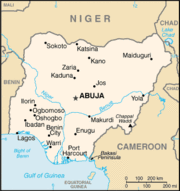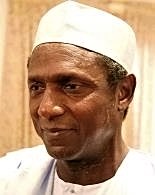
Nigeria, officially named the Federal Republic of Nigeria, is a federal constitutional republic comprising thirty-six states and one Federal Capital Territory.
Nigeria, officially named the Federal Republic of Nigeria, is a federal constitutional republic comprising thirty-six states and one Federal Capital Territory. The country is located in West Africa and shares land borders with the Republic of Benin in the west, Chad and Cameroon in the east, and Niger in the north. Its coast lies on the Gulf of Guinea, part of the Atlantic Ocean, in the south. The capital city is Abuja.
The people of Nigeria have an extensive history, and archaeological evidence shows that human habitation of the area dates back to at least 9000 BC.[2] The Benue-Cross River area is thought to be the original homeland of the Bantu migrants who spread across most of central and southern Africa in waves between the 1st millennium BC and the 2nd millennium AD.
Nigeria is the most populous country in Africa and the eighth most populous country in the world with a population of over 140 million. The country is listed among the "Next Eleven" economies.

Umaru Yar'Adua of the People's Democratic Party is the current president of Nigeria
Babangida's caretaker regime headed by Ernest Shonekan survived only until late 1993 when General Sani Abachatook power in another military coup. Abacha proved to be perhapsNigeria's most brutal ruler and employed violence on a wide scale tosuppress the continuing pandemic of civilian unrest. Abacha was notonly brutal but very corrupt.[13]While Babaginda encouraged his friends, family and himself to stealmoney, Abacha made corruption a family affair. Money had been found invarious western European countries banks traced to him. He avoided coupplots by bribing army generals. Several hundred millions dollars inaccounts traced to him were unearthed in 1999.[14]
The regime would come to an end in 1998 when the dictator was founddead amid dubious circumstances. Abacha's death yielded an opportunityfor return to civilian rule. Nigeria re-achieved democracy in 1999 whenit elected Olusegun Obasanjo, a Yoruba and former military head of state, as the new President ending almost thirty three-years of military rule (between from 1966 until 1999) excluding the short-lived second republic (between 1979-1983) by military dictators who seized power in coups d'état and counter-coups during the Nigerian military juntas of 1966-1979 and 1983-1998.
Although the elections which brought Obasanjo to power in 1999 andagain in 2003 were condemned as unfree and unfair, Nigeria has shownmarked improvements in attempts to tackle government corruption and tohasten development. While Obasanjo showed willingness to fightcorruption, he was accused by others of the same.[attribution needed]
Umaru Yar'Adua, of the People's Democratic Party, came into power in the general election of 2007--anelection that was witnessed and condemned by the InternationalCommunity as being massively flawed. Ethnic violence over the oilproducing Niger Delta region (see Conflict in the Niger Delta), interreligious relations and inadequate infrastructure are current issues in the country.
